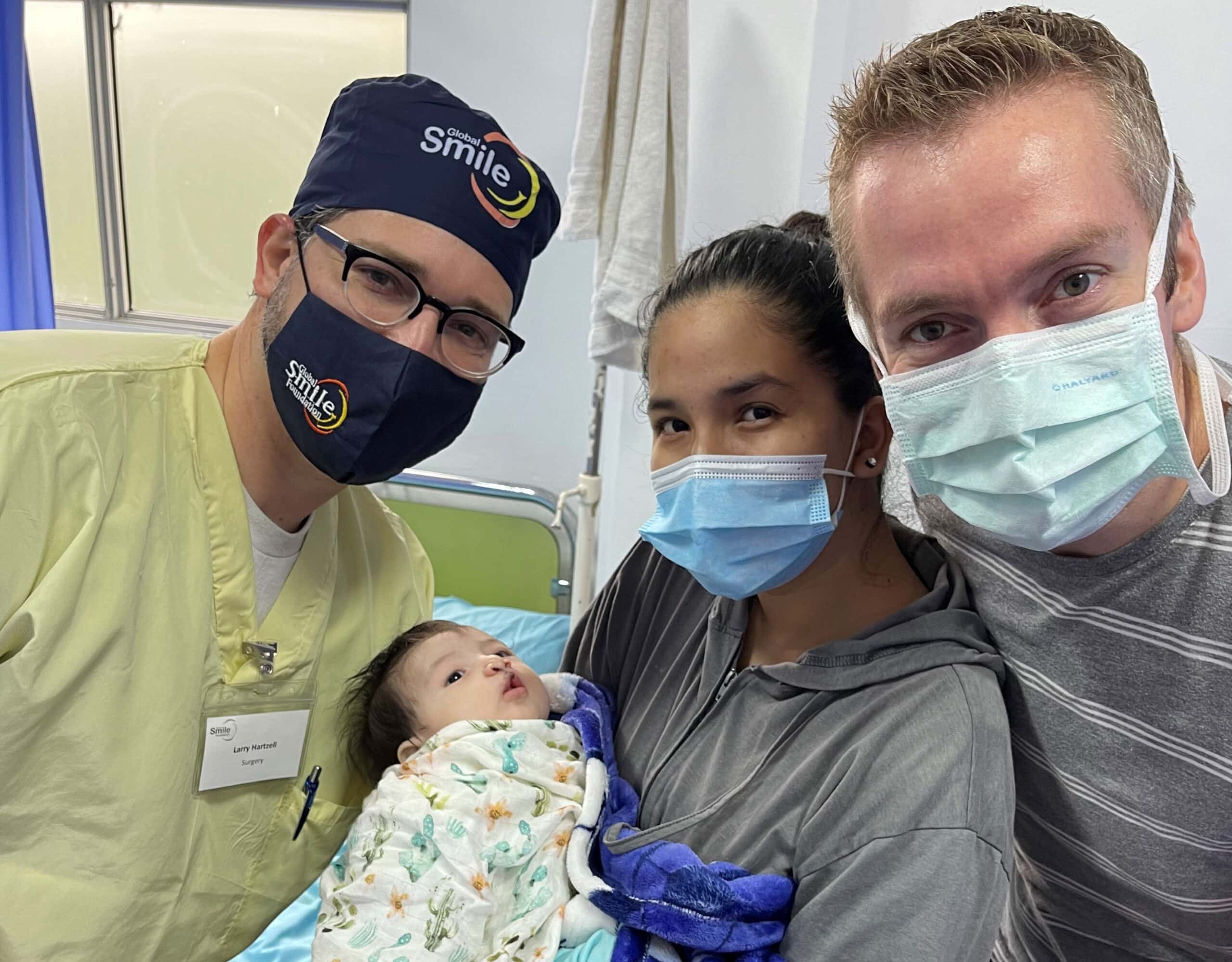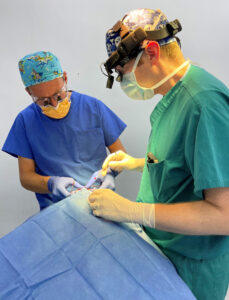Two UAMS ENT Physicians Help Treat More Than 90 Children in Ecuador
| Two doctors from the University of Arkansas for Medical Sciences (UAMS) Department of Otolaryngology recently flew to Guayaquil, Ecuador, as part of a surgical mission trip that provided cleft lip and palate care to more than 90 children.
The trip was part of a Global Smile Foundation project that began more than three decades ago and aims to make comprehensive cleft care available to all patients, regardless of geographic or socioeconomic barriers.
But after the mid-September trip, it wasn’t just the children and their family members, some of whom had ridden on buses as long as 24 hours to take advantage of the free surgery, who were smiling.
Larry Hartzell, M.D., an associate professor of otolaryngology, and Jeffrey Dorrity, M.D., the department’s pediatric otolaryngology fellow, couldn’t help but break into smiles themselves while describing how much they also benefited.
“It’s definitely emotionally rewarding,” Hartzell said. “You really see the impact.”
Dorrity, who before coming to UAMS was an otolaryngologist in private practice in South Dakota, pursued the pediatric fellowship at UAMS largely because of the opportunity to learn to perform cleft surgeries and participate in mission trips such as this.
“This is the first time I participated in a mission focused on cleft care,” he said, although as a senior resident in Minnesota he went on a mission trip to Ethiopia to train residents in ear surgery, and as a medical student, he visited Panama with a cardio-thoracic team.
“It was unlike any trip I’ve been on and was better than anything I had anticipated,” he said. “The Global Smile Foundation has really done a good job of finding the experts across the country and bringing them together. So it was really good for the patients, and as a fellow, there was an added benefit in that I got to learn from people all over the country, in addition to caring for these patients. I was on cloud nine the whole time I was there.”
A cleft is an opening in the upper lip and/or palate (roof of the mouth) that occurs early in pregnancy when the developing facial structure doesn’t fuse together completely. They can occur together or separately.
The Global Smile Foundation aims to treat patients born with a cleft lip at the age of 3 months, and patients born with a cleft palate when they are 12 to 18 months old, to stave off future problems with speech development and social integration.
In this case, Hartzell said most of the patients he and Dorrity treated in Ecuador were babies as young as 3 months, but some other patients were between 2 and 4 years old, having lacked access to surgery for a year and a half because of the COVID-19 pandemic.
Hartzell, director of the Cleft Lip and Palate Program at Arkansas Children’s, is fellowship-trained in complex pediatric otolaryngology. He is also a veteran of mission trips to provide the vital surgery that allows children to breathe, eat, speak and hear normally, as well as to grow up without being bullied for having a facial deformity.
While he has been on mission trips to other countries to provide specialty ear, nose and throat care, he hadn’t been to Ecuador since 2016.
“These are people that don’t have the opportunity for the care otherwise,” Hartzell said. “Many of them have been waiting years to get these surgeries done, and in many cases they’ve been staying home and hiding themselves because they’re basically being rejected by society. When they’re finally able to get the surgery done, it’s just really super impactful for them.”
While cleft lip and/or palate is one of the most common birth defects in the world, even in the United States, the lack of organized health care in impoverished countries, where there is also a scarcity of plastic surgeons and proper training to become plastic surgeons, makes it especially difficult for patients to obtain treatment.
“There’s not enough people trained in doing it, and the system is not in place as well for getting them the same quality of care,” Hartzell said.
Also, poor prenatal nourishment is more prevalent in third-world countries. Hartzell said there is less awareness in developing countries about the effects of smoking and drinking on a developing child, adding that other conditions that affect a baby’s development, such as diabetes, usually aren’t as well controlled.
“Here in the states, we really stress the importance of prenatal vitamin use and getting prenatal care,” Hartzell said. “It’s really in the first four to eight weeks of life, when the baby is growing, that they need that extra folate, extra vitamins. If you’re not even aware you’re pregnant until you’re one or two months along, then it’s often too late,” he said.
Hartzell also invited a former UAMS otolaryngology fellow, Robert Glade, M.D., who is now a pediatric otolaryngologist in Oklahoma City, on the trip to Ecuador.
He said he likes to take fellows because “it’s just a great training opportunity to be able to do a lot of the same procedures in a short period of time, which can really help enhance your skills. Also, it’s just a neat experience to provide that kind of service and really see the impact it has on the families.”
Hartzell and Dorrity arrived in Ecuador on a Saturday and spent the next six days working on patients, including five days straight of performing usually three to four major surgeries a day. Some surgeries took 1.5 to 2 hours, while others lasted 3 to 4 hours, depending on the procedure.
“It was exhausting physically, but definitely emotionally rewarding,” Hartzell said.
The group included five attending surgeons, including Hartzell, and three trainees, including Dorrity, who were able to use operating rooms and beds at Hospital Leon Becerra, a cooperating local facility dedicated to pediatric care for low-income families.
Most patients stayed in the hospital a night or two and then returned a week later for follow-up care by health care workers who remain for a time after the surgeons leave.
Though there are some other groups who visit Ecuador to provide cleft care, the Global Smile Foundation is the largest provider of comprehensive cleft care there. Its long roots in the city help the operation run smoothly, with experienced volunteers, including some former patients, holding screening clinics to evaluate potential patients to ensure they don’t have COVID-19 or other medical issues that could preclude them from surgery.
Though Hartzell speaks fluent Spanish, Dorrity said he appreciated that the team included interpreters to make it easy to communicate with patients and families.
“But seeing their joy, seeing their happy tears, you don’t need to speak the language to understand the emotion they’re sharing,” he added. “Just seeing that change for the parents, it’s really a humbling thing to be allowed to be a part of. That was certainly the most gratifying part.”
Hartzell said he was so impressed with the group’s professionalism under the leadership of Usama Hamdan, M.D., its founder and president, that he hopes to return every year.
“He has such a passion for what he does, and he makes sure he gets good people who are committed and who are going to provide excellent care. It’s just a great organization,” Hartzell said.
Both he and Dorrity said they also enjoyed the camaraderie of working alongside other physicians, sharing knowledge and comparing techniques.
“It benefits the patients there, but it also benefits my patients here,” Hartzell said.
Hartzell said he was excited to pilot a new technology by wearing a headband with a camera on it that allowed an expert in another location to see what he was doing as he was doing it and to provide real-time feedback. Using that technology, he was able to perform a new type of cleft lip repair.
In turn, Hartzell said, he later shared his experience at an international conference.
In addition to the learning, the group of volunteers — physicians, nurses and scrub technicians — also had some time to network and form friendships.
“You really bond with each other because you’re all there for the same reason, to care for the less fortunate and change their lives,” Hartzell said. “What’s amazing is how much your own life changes in the process.”
Dorrity said the experience also reinforced his belief that “absolutely this is what I want to do with my life and career.”


